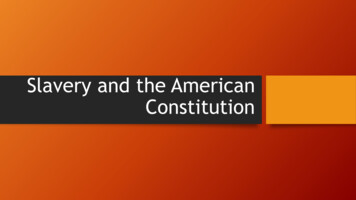
Transcription
Slavery and the AmericanConstitution
Slavery on Caribbean plantations Often owned by absentee Britishowners who also were members ofBritish parliament and very rich This approach was coupled withthe increasingly acceptableattitude that money making wasacceptable to the elite Some island populations were 90%slaves Slave rebellions became thegreatest concern of non-slaveinhabitants and British and otherowners addressed this in part bygetting out of town
White and mixed-raceoverseers were theplantation managers Absentee ownership became amodel for South Carolinalow country rice planters inthe 18th and 19th century This arrangement separatedthe owners from the slavesmaking slavery and itscruelties remote and morepervasive
Freeman also owned slaves onsmaller sugar plantations Caribbean islands produced somuch income for British ownersand government that one half ofthe British troops in America in1788 were shipped to theCaribbean after the 1788american-French treaty forprotection against the Frenchfleet British sugar exports exceed thevalue of American exports
West Indies also became a critical exportmarket from British America of food and shipsupplies
Take AwaysMarket demand for slave produced productscaused creation and expansion of slaveryRacism led to enslavement of AfricansSlavery was back end justified by tradition andsense of cultural superiorityWestern Slavery grew out of technologicaldevelopmentSlavery was a culturally accepted practice inEurope and the New WorldSlavery sanctioned by state and moralauthoritiesSlavery without competition from non slavelaborSlavery was a major contributor to the growthof the new world
Slavery in colonial North America Most slaves who were broughtor kidnapped to the ThirteenBritish colonies — the Easternseaboard of what laterbecame the United States — wereimported from the Caribbean, notdirectly from Africa. South Carolina became sourcefor food for Caribbean Islands
Indigenous peoples were alsoenslaved in the NorthAmerican colonies, but on asmaller scaleIndian slavery largely endedin the late eighteenth centurythough the enslavement ofIndigenous people did continueto occur in the Southernstates until the EmancipationProclamation
By the time of the American Revolution,Native Americans and Africans wereenslaved throughout the colonies.working on farms as laborers, in citiesas artisans and mechanics (New Yorkcity had a large slave population) andin the south on tobacco, rice and indigoplantations.Indentured servitude failed due tomanagement, investment and alternativeemployment problemsBritish in the Revolutionary Warattempted strategic use of slavesAmericans waivered on using slaves inthe Continental Army
Slavery and the ConstitutionWhy this is important?The extent of the Constitution’s effecton slavery and state’s rights would beof continual debate from 1787 until thecoming of the Civil War in 1861.
Slavery at the time of theAmerican Revolution andConstitutional Convention of1787 was firmly established inthe five southern states fromMaryland to Georgiamore than a trivial presencein most of the others
Each colony before the Revolutionhad an accumulated body of slave lawthat did not so much establish slaveryas acknowledge its presence, sanctionit, and regulate its conduct.Slavery had been part of the socialand economic climate of the coloniesfor over 100 years before 1776.
The Slave Codes were colonylegislation addressing the legalstatus of slaves, includingpunishment, inheritance, damages,manumission, sale, and other legalaspects of slavery
De facto colonial selfgovernment had alsobeen in effect for about75 years
The Declaration ofIndependenceA defense or reason forthe July 2, 1776declaration vote of theContinental Congress
Thomas Jefferson,Virginia Delegateto the ContinentalCongress and partof the Declarationdrafting committee
Jefferson wrote TheDeclaration ofIndependence with priordocuments before himand in the Lockeantradition of naturalrights and freedoms,including propertyrights.John Locke 1632-1704
The basis of legitimategovernment was the consentof the governed, not divineauthority granted tomonarchs by GodFreedom was the naturalpre-government state of allreasonable men; to Lockethis was a “self evidenttruth”People gave up designatedfreedoms to live under agovernment under a socialcontract
The duty of that government is toprotect the natural rights of thepeople, which Locke believed toinclude LIFE, LIBERTY, AND PROPERTYIf the government should fail toprotect these rights, its citizens havethe right to overthrow thatgovernmentThis idea deeply influenced THOMASJEFFERSON as he draftedthe DECLARATION OF INDEPENDENCESlavery for Locke was the continuationof Just war between the slave andmaster
The Declaration of Independence (1776)Preamble – the basis for the Declaration“We hold these truths to be selfevident, that all men are createdequal, that they are endowed bytheir Creator with certainunalienable Rights, that amongthese are Life, Liberty and thepursuit of Happiness.”
Jefferson’s Deleted Slavery PassageHe [King George III] has waged cruel war against human natureitself, violating its most sacred rights of life and liberty in thepersons of a distant people who never offended him, captivating &carrying them into slavery in another hemisphere or to incurmiserable death in their transportation thither. This piraticalwarfare, the opprobrium of infidel powers, is the warfare of theChristian King of Great Britain. Determined to keep open a marketwhere Men should be bought & sold, he has prostituted his negativefor suppressing every legislative attempt to prohibit or restrain thisexecrable commerce.
After the achievement of independence, slaveryremained what it had been before - an institutionhistorically antecedent to the laws governing it andlegally the creature of local (now state) authority
Slaves numbered about 500,000 in 1780,constituting a little more than one-sixth ofthe national population.In the South, two persons out of every fivewere slaves.Slavery a distinctive element in the southernsocial order; the peculiar institution.
o The slave production of staple cropsdominated southern agriculture andsuited the development of a nationalmarket economy with an otherwise greatlabor shortage.o Slaveholders played such a vigorous partin the expansion of the American frontierthat slaves already comprised about onesixth of the population living inKentucky and the Southwest.
o However, slavery was an institutionunder severe scrutiny, both as a matterof conscience and/or as a matter ofpublic interest.o Many Americans found it difficult tosquare slave-holding holding with theprinciples of Christianity, and thePreamble of the Declaration ofIndependence
The Articles of ConfederationThe Articles of Confederation,formally the Articles ofConfederation and PerpetualUnion, was an agreement amongthe 13 original states that servedas the first constitution. This wasthe “Revolutionary WarConstitution”.
The Articles, inter alia, addressed thebasis of contributions (taxes) to theContinental Congress and 13 colonies.Tax or contribution basis was on value ofpropertyAt one time it was proposed that propertybe substituted with population. Slaveswere to count as 3/5ths of a person.Why? Never enacted though.
1787 Constitution wouldreplace the Articles from theneed for power and order: Power through stableunity in a centralgovernment with taxationpower Order through aConstitution addressingadded governing issues
Before the Constitutional ConventionThe Western landso Americans of the Revolutionary Eraregarded the "West" as those landsbetween the Appalachian Mountainsand the Mississippi River.o The area beyond the Mississippi wasthen largely unexplored and in thepossession of foreign powers.
The West had been the object of much recent contention;Britain and France bitterly struggled for control of the areaduring the French and Indian War (1754-1763).
o In the aftermath of French IndianWar, Britain attempted to halt thewestward movement of Americansettlers in the Proclamation of1763.o This “halt” was attempt at Britishcost reduction and the Britishstrategy of Empire.
By the 1780s, seven of the 13 original stateshad enunciated claims to areas in the West.These "landed" states had a great potentialadvantage over the six "landless" states.Assumed that the future sale of westernlands would enrich the landed states andpossibly allow them to operate without anyform of taxation.The landless states feared that they wouldlose residents and dwindle intoinsignificance.
o The claims to the western lands rooted inthe vague wording of old colonialcharters.o Claims often overlapped one another,pitted one state's interests against another.o The land claim states were Virginia,Connecticut, Massachusetts, New York,North Carolina, South Carolina andGeorgia.
o The pre Constitution Congresssuccessfully worked to induce the statesto surrender control of their western landclaims to the central government.o The ceding of western lands by the stateswas accompanied by a series of lawspassed by the Articles Congress toorganize the areas and prepare them forstatehood. These measures includedthe Great Northwest Ordinance in 1787
o The Northwest Ordinance of 1787among other things prohibitedslavery in the northwest territoryo The ordinance passed with littleresistance from the southern statesas they did not want a competitorfor the rice, tobacco and cottongrown by them in 1787.
The ConstitutionThe framers of the Constitution, dealing with slavery as an incidental buttroublesome circumstance, recognized slavery but provided no nationallegal status
o The Constitution does not mention theDeclaration of Independence & seems toembrace principles plainly inimical to theDeclaration.o The Constitution does not use the term“slaves” anywhereo The South historically maintained theConstitution sanctioned slaveryo The North agreed and disagreed (theConstitution was neutral)
o The South occupied firmer ground when they cited therecord of government practice as an authoritativeguide to the established meaning of the Constitution.o Among their prime exhibits were the treaties ofpeace with Britain in 1783 and 1815, both ofwhich contained clauses making provision forcertain slaves and "other property."o A direct tax on property levied by Congress in1813 had specifically included slaveso Arguments about slavery and the federalgovernment almost always turned into argumentabout slavery and the intent of the Constitution
The Constitution and the Slavery QuestionPreambleWe the People of the United States, in Orderto form a more perfect Union, establishJustice, insure domestic Tranquility, providefor the common defense, promote thegeneral Welfare, and secure the Blessings ofLiberty to ourselves and our Posterity, doordain and establish this Constitution for theUnited States of America
Constitution Article. I. - Section 2 - TheHouse and the 3/5ths clauseRepresentatives [the House ofRepresentatives] and direct Taxes shallbe apportioned among the several Stateswhich may be included within thisUnion, according to their respectiveNumbers, which shall be determined byadding to the whole Number of freePersons, including those bound toService for a Term of Years, andexcluding Indians not taxed, three fifthsof all other Persons
The source of the three fifths clause –The Articles of ConfederationThe effect of the clauseSouthern strategyNorthern irritation
Article i, section 3The Senate of theUnited States shall becomposed of twoSenators from eachState, chosen by theLegislature thereof, forsix Years; and eachSenator shall have oneVote.
Section 9 - Limits on Congress and the SlaveTradeThe Migration or Importation of such Personsas any of the States now existing shallthink proper to admit, shall not be prohibited bythe Congress prior to the Year onethousand eight hundred and eight, but a tax orduty may be imposed on such Importation,not exceeding ten dollars for each Person.
Article. IV. - The States and Fugitive SlavesNo Person held to Service or Labour in oneState, under the Laws thereof, escaping intoanother, shall, in Consequence of any Law orRegulation therein, be discharged from suchService or Labour, but shall be delivered up onClaim of the Party to whom such Service orLabour may be due.
TariffsNo Tax or Duty shall be laid on Articlesexported from any State.No Preference shall be given by anyRegulation of Commerce or Revenue tothe Ports of one State over those ofanother: nor shall Vessels bound to, orfrom, one State, be obliged to enter,clear, or pay Duties in another
Article. IV. - The StatesSection 3 - New States may be admitted by theCongress into this Union . . . The Congress shallhave Power to dispose of and make all needfulRules and Regulations respecting the Territory orother Property belonging to the United States; andnothing in this Constitution shall be so construedas to Prejudice any Claims of the United States, orof any particular State.
Article. V. - AmendmentThe Congress, whenever two thirds ofboth Houses shall deem it necessary,shall propose Amendments to thisConstitution
Article. VII. - RatificationThe Ratification of the Conventions ofnine States, shall be sufficient for theEstablishment of this Constitutionbetween the States so ratifyingthe Same.Convention reps chosen by vote ofindividual state voters
5th AmendmentNo person shall be deprived oflife, liberty, or property, withoutdue process of law; nor shallprivate property be taken forpublic use without justcompensation
Points to Consider25 of the 55 Convention delegates were slaveownersThere was fear of internal dissent and outsideinfluence n 1787The Constitution had to be ratified by at least 9states to be effective.Most of the convention delegates would haveadmitted that slavery was going to wither awayin the next 15 to 25 years
The Federalist Papers, a seriesof essays, argued in favor ofapproving the new ConstitutionOne argument made was thatunless united, based onEuropean history the stateswere more likely to go to waramong themselves forcompetitive economic reasons;andThe enemy of democracy wasfactions
Next WeekThe Empire of Cotton
The Constitution and the Slavery Question Preamble We the People of the United States, in Order to form a more perfect Union, establish Justice, insure domestic Tranquility, provide for the common defense, promote the general Welfare, and secure th
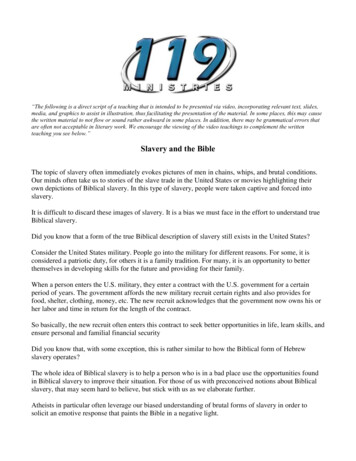
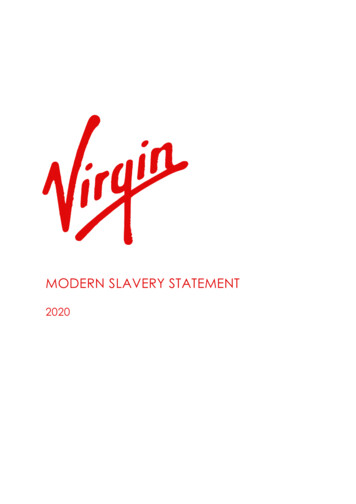

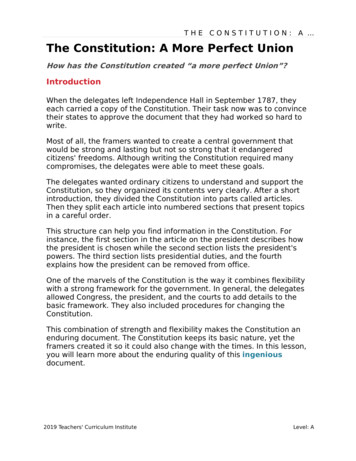

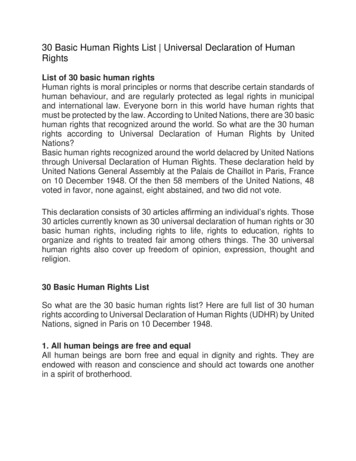
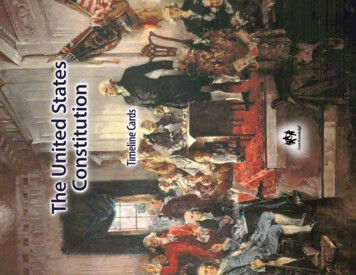
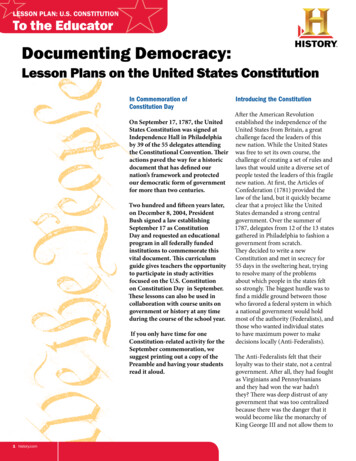
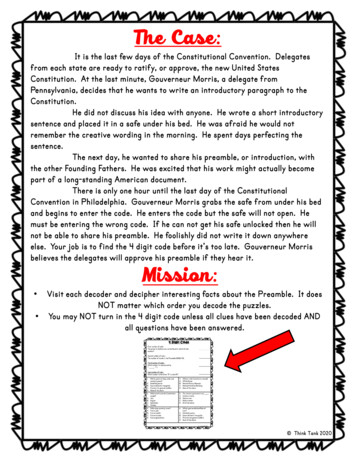
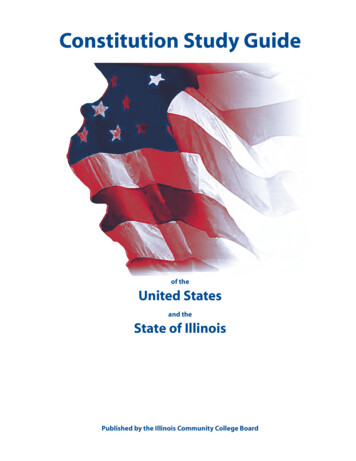
![[Final] Documenting the University of Pennsylvania’s .](/img/9/csgraubard-documenting-the-university-of-pennsylvanias-connection-to-slavery.jpg)